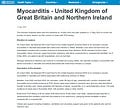On 16 May, the World Health Organisation (WHO) issued an alarming press release on a cluster of hospitalised neonates (newborns) from Wales and Southwest England, suffering from myocarditis, between June 2022 and April 2023.
A day later, the press release was updated to correct the number of cases and deaths. Ten hospitalised neonates (15 originally) an…
Keep reading with a 7-day free trial
Subscribe to Sonia Elijah investigates to keep reading this post and get 7 days of free access to the full post archives.


